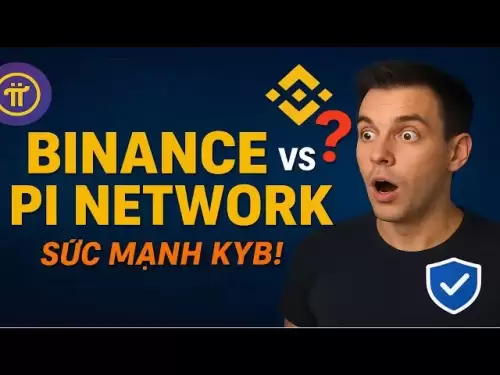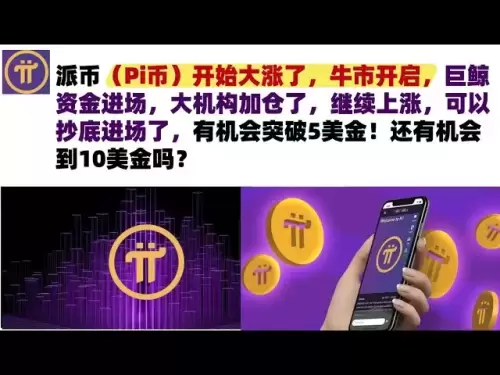-
 Bitcoin
Bitcoin $116900
0.00% -
 Ethereum
Ethereum $4280
5.48% -
 XRP
XRP $3.265
-1.45% -
 Tether USDt
Tether USDt $1.000
-0.01% -
 BNB
BNB $807.0
1.41% -
 Solana
Solana $183.1
2.93% -
 USDC
USDC $0.9999
0.00% -
 Dogecoin
Dogecoin $0.2440
6.50% -
 TRON
TRON $0.3357
-0.88% -
 Cardano
Cardano $0.8178
2.63% -
 Hyperliquid
Hyperliquid $44.13
7.45% -
 Chainlink
Chainlink $21.39
9.09% -
 Stellar
Stellar $0.4524
-0.84% -
 Sui
Sui $3.957
2.13% -
 Bitcoin Cash
Bitcoin Cash $572.7
-2.54% -
 Hedera
Hedera $0.2671
1.54% -
 Avalanche
Avalanche $24.77
4.17% -
 Ethena USDe
Ethena USDe $1.001
0.02% -
 Litecoin
Litecoin $122.3
-1.94% -
 Toncoin
Toncoin $3.432
2.26% -
 UNUS SED LEO
UNUS SED LEO $9.007
0.49% -
 Shiba Inu
Shiba Inu $0.00001396
5.26% -
 Uniswap
Uniswap $11.09
1.64% -
 Polkadot
Polkadot $4.155
4.57% -
 Dai
Dai $1.000
0.00% -
 Pepe
Pepe $0.00001253
5.11% -
 Cronos
Cronos $0.1588
2.67% -
 Bitget Token
Bitget Token $4.512
0.05% -
 Monero
Monero $275.0
0.64% -
 Ethena
Ethena $0.7527
15.10%
What are the methods for selling Maple Token (MPL) coins?
When selling Maple Token (MPL), consider the trading volume, liquidity, and transaction fees offered by various methods, such as centralized exchanges, decentralized exchanges (DEXs), over-the-counter (OTC) marketplaces, self-custody wallets, and peer-to-peer (P2P) platforms.
Dec 24, 2024 at 10:41 pm

Key Points:
- Understand the various methods available for selling Maple Token (MPL) coins.
- Weigh the pros and cons of each method to choose the most suitable option.
- Consider the security measures and fees associated with each method.
Methods for Selling Maple Token (MPL) Coins:
1. Centralized Exchanges:
- Choose reputable exchanges with high trading volume and liquidity.
- Verify account identity through KYC/AML procedures.
- Sell MPL directly to other users on the exchange's platform.
- May offer advanced order types, such as limit orders and stop-losses.
Pros:
- High liquidity ensures quick execution of trades.
- User-friendly interface simplifies trading process.
Cons:
- May charge higher transaction fees compared to other methods.
- Limited control over transaction fees.
2. Decentralized Exchanges (DEXs):
- Connect directly to a peer-to-peer network without intermediaries.
- Trade MPL with other users using smart contracts.
- Offer greater anonymity than centralized exchanges.
- May provide more flexibility in terms of slippage and transaction fees.
Pros:
- Reduced transaction fees.
- Higher level of control over trades.
Cons:
- Lower liquidity than centralized exchanges.
- Complex user interface may be challenging for beginners.
3. Over-the-Counter (OTC) Marketplaces:
- Connect with brokers or market makers to trade large quantities of MPL privately.
- Offer customizable transaction terms and lower fees for bulk trades.
- Provide greater flexibility in terms of pricing and settlement.
Pros:
- Tailored transactions based on specific needs.
- Potentially lower transaction fees for large trades.
Cons:
- May require higher minimum trade sizes.
- Less transparent and regulated than other methods.
4. Self-Custody Wallets:
- Store MPL in a personal cryptocurrency wallet that you control.
- Utilize decentralized exchanges or OTC marketplaces using the wallet's integrated features.
- Provides complete control over your funds.
Pros:
- Enhanced security and privacy.
- No transaction fees for self-transfers.
Cons:
- Requires a higher level of technical knowledge.
- Limited liquidity and trading options compared to other methods.
5. Peer-to-Peer (P2P) Platforms:
- Trade directly with other individuals without intermediaries.
- Negotiate prices and settlement methods independently.
- May offer greater flexibility and anonymity.
Pros:
- Potential for lower transaction fees.
- Increased privacy and control over transactions.
Cons:
- Can be time-consuming to find suitable counterparties.
- May require strong due diligence to ensure counterparty reliability.
FAQs:
Q: What factors should I consider when choosing a method to sell MPL coins?
- Trading volume and liquidity.
- Transaction fees and slippage tolerance.
- Security measures and reputation of platforms.
- Convenience and user interface.
Q: Can I sell MPL coins anonymously?
- Decentralized exchanges and self-custody wallets offer enhanced anonymity.
- OTC marketplaces may provide customizable privacy options.
- P2P platforms can facilitate anonymous trades if desired.
Q: What are the security risks associated with selling MPL coins?
- Reputable exchanges and platforms prioritize security measures.
- Use strong passwords, enable 2FA, and store coins securely.
- Be cautious of phishing scams and imposters.
Q: Are there any fees involved in selling MPL coins?
- Centralized and decentralized exchanges typically charge transaction fees.
- OTC marketplaces may offer lower fees for bulk trades.
- Self-custody wallets may have limited fees, primarily for network transactions.
Q: How long does it usually take to sell MPL coins?
- Execution time can vary depending on the method chosen.
- Centralized exchanges offer quick execution.
- DEXs and OTC marketplaces may require some waiting time for order matching.
- Self-transfers and P2P trades can be processed within minutes.
Disclaimer:info@kdj.com
The information provided is not trading advice. kdj.com does not assume any responsibility for any investments made based on the information provided in this article. Cryptocurrencies are highly volatile and it is highly recommended that you invest with caution after thorough research!
If you believe that the content used on this website infringes your copyright, please contact us immediately (info@kdj.com) and we will delete it promptly.
- Trump, Nasdaq, and Token Treasury: WLFI's $1.5B Gambit
- 2025-08-10 06:50:12
- Trump, Nasdaq, and Token Treasury: WLFI's $1.5B Play
- 2025-08-10 06:30:11
- Coinbase, DEX Trading, and Base Network: A New Era for Crypto?
- 2025-08-10 06:30:11
- Block Inc., Bitcoin, and Mining Chips: Reshaping Digital Finance, New York Style
- 2025-08-10 06:50:12
- Stablecoin Surge Ignites Altcoin Investment Hunt: What's Hot Now?
- 2025-08-10 06:55:16
- Penny Crypto Dreams: Can XRP Reach $10,000? A Look at LILPEPE and the Meme Coin Mania
- 2025-08-10 04:50:11
Related knowledge

How to purchase Aragon (ANT)?
Aug 09,2025 at 11:56pm
Understanding Aragon (ANT) and Its PurposeAragon (ANT) is a decentralized governance token that powers the Aragon Network, a platform built on the Eth...

Where can I buy UMA (UMA)?
Aug 07,2025 at 06:42pm
Understanding UMA and Its Role in Decentralized FinanceUMA (Universal Market Access) is an Ethereum-based decentralized finance (DeFi) protocol design...

How to buy Storj (STORJ) tokens?
Aug 09,2025 at 07:28am
Understanding Storj (STORJ) and Its Role in Decentralized StorageStorj is a decentralized cloud storage platform that leverages blockchain technology ...

What is the best app to buy Nano (NANO)?
Aug 09,2025 at 03:35am
Understanding Nano (NANO) and Its Unique FeaturesNano is a feeless, instant cryptocurrency designed for fast peer-to-peer transactions. Unlike many ot...

Where can I purchase Siacoin (SC)?
Aug 08,2025 at 11:14am
Understanding Siacoin (SC) and Its Role in the Sia NetworkSiacoin (SC) is the native cryptocurrency of the Sia decentralized cloud storage platform, a...

How to sell my Ontology (ONT) tokens?
Aug 09,2025 at 06:08pm
Understanding Ontology (ONT) and Its Trading EcosystemBefore selling your Ontology (ONT) tokens, it's essential to understand the nature of the crypto...

How to purchase Aragon (ANT)?
Aug 09,2025 at 11:56pm
Understanding Aragon (ANT) and Its PurposeAragon (ANT) is a decentralized governance token that powers the Aragon Network, a platform built on the Eth...

Where can I buy UMA (UMA)?
Aug 07,2025 at 06:42pm
Understanding UMA and Its Role in Decentralized FinanceUMA (Universal Market Access) is an Ethereum-based decentralized finance (DeFi) protocol design...

How to buy Storj (STORJ) tokens?
Aug 09,2025 at 07:28am
Understanding Storj (STORJ) and Its Role in Decentralized StorageStorj is a decentralized cloud storage platform that leverages blockchain technology ...

What is the best app to buy Nano (NANO)?
Aug 09,2025 at 03:35am
Understanding Nano (NANO) and Its Unique FeaturesNano is a feeless, instant cryptocurrency designed for fast peer-to-peer transactions. Unlike many ot...

Where can I purchase Siacoin (SC)?
Aug 08,2025 at 11:14am
Understanding Siacoin (SC) and Its Role in the Sia NetworkSiacoin (SC) is the native cryptocurrency of the Sia decentralized cloud storage platform, a...

How to sell my Ontology (ONT) tokens?
Aug 09,2025 at 06:08pm
Understanding Ontology (ONT) and Its Trading EcosystemBefore selling your Ontology (ONT) tokens, it's essential to understand the nature of the crypto...
See all articles

























































































